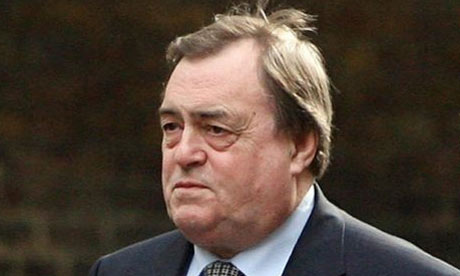 John Prescott, whose activities in the lead-up to Copenhagen I drew attention to in an earlier post, continues to make waves in Guardian reports. Is he fighting on two fronts?
John Prescott, whose activities in the lead-up to Copenhagen I drew attention to in an earlier post, continues to make waves in Guardian reports. Is he fighting on two fronts?
Yesterday he reiterated his basic position when he launched the campaign New Earth Deal, on behalf of the Parliamentary Assembly of the Council of Europe.Â
“Securing a deal at Copenhagen will be 10 times more difficult than Kyoto.
“We believe that any deal negotiated must consider the principle of common but differentiated responsibilities and respective capabilities.
“That means that social justice and the reduction of poverty must be at the very heart of any agreement. It also means equalising greenhouse gas emissions per head in each country.
“The climate change we’re experiencing across the world has been caused by the richer developed countries. They must now recognise the central principle that the polluter pays.
“But since climate change affects all nations whatever their size, wealth or population, a consensus is absolutely necessary for a binding and sustainable agreement.
“Failure is not an option at Copenhagen and that’s why our Europe-wide campaign will be galvanising public opinion to lobby governments to make that deal.”
This remains stongly committed reassuring stuff, but on Sunday Prescott also spoke of the need for a Plan B fallback in the event of Copenhagen failing to reach agreement between the main parties.Â
If stalemate threatened over the details he suggested the possibility of accepting a longer timetable for cuts in carbon emissions that are supposed to be achieved by 2020 and then by 2050. He argued that it was more important to get a deal “on the principles” of how high-carbon lifestyles are tackled worldwide.
He acknowledged that moving away from the targets would bring accusations of having sold out, but said that provided the summit accepted clear principles of a deal to shift towards low-carbon lifestyles there could be agreement to flesh out the details later. While insisting that common ground could be found despite resistance to targets among developing countries, he said there could be “conflict” over the timetable. “We might not be able to get it by 2020 or by 2050 but [we should] agree the principles.”
Part of me says “don’t even think of itâ€. We must insist that a global deal is hammered out at Copenhagen, and any fall-back notion will only weaken the pressure on policy makers who are already moving at snail’s pace. But another part says if that is the best we can get it will have to do in the meantime, and it is at least, as Prescott envisages it, a significant step forward.Â
But if Plan B turned out to be all we could get, policy makers should be left dissatisfied with their achievement, and be reminded of the substance of John Holdren’s comment in his recent interview with Elizabeth Kolbert:Â
“I’m not saying it’s the end of the world if we don’t get it done in Copenhagen, but it becomes harder and harder to get on the sort of trajectory we need to be on to reduce the chance of the worst happening in climate change the longer we delay.”
Prescott can’t be accused of letting up on the New Earth Deal campaign. Among the other plans outlined in the earlier post he is planning to make full use of the internet. There will be a social networking website where people can learn about the issues, follow the campaign on Twitter and Facebook, do their own climate change deal and have it automatically sent to their Council of Europe politician and the environment minister for their own countries.

2 thoughts on “Prescott: Plan B for Copenhagen failure?”